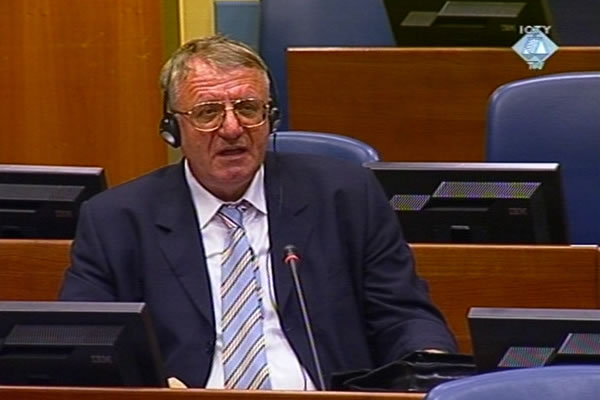Home
TRUE OR FALSE SESELJ’S MEN IN MOSTAR
Protected witness described in detail the crimes of Seselj’s men in Mostar and its environs. The accused contends that local paramilitaries were responsible for the crimes. According to the accused, the paramilitaries ‘misrepresented themselves’ as the SRS volunteers. Seselj indicated he intended to call for his acquittal in March, after the prosecution has rested its case. According to Seselj, the prosecution failed to prove his responsibility on all counts
 Vojislav Seselj in the courtroom
Vojislav Seselj in the courtroom At the trial of the Serbian Radical Party leader Vojislav Seselj, protected witness VS-1067 spoke in detail about the terror campaign of Seselj’s men in Mostar in the spring of 1992. ‘They were completely wild, they even killed each other’, the witness said. ‘People were afraid of them’. The Trial Chamber called the witness to testify in The Hague after he refused to testify as a prosecution witness, because, as he explained today, ‘Seselj’s collaborators’ threatened to kill his family in 2007 if he didn’t refuse to testify.
The witness, former member of the Cicolina unit of the Mostar Territorial Defense, said that the situation in the town suddenly deteriorated in October 1991, when a large number of reservists from Montenegro arrived; they had participated in the siege of Dubrovnik. ‘They harassed everybody,’ the witness recounted. The witness also noted that a mass mobilization of Serbs was underway in Mostar while Croats and Muslims were refused when they wanted to join.
As the witness explained, the SRS volunteers started arriving in May 1992. The first commander was Mico Drazic, who was later replaced by a man called Vranjanac. ‘There were 55 or 60 of them and they came in three trucks. They had new uniforms and the JNA gave them rocket launchers and everything else they needed’, the witness recounted. Other volunteer units were also there, including another unit of ‘Seselj’s men’ headed by Rade Radovic, the Red Berets and ‘Chetniks’ under the command of Arsen Grahovac.
As the witness noted, ‘Seselj’s men’ and other paramilitary units were armed by Colonel Momcilo Perisic, who commanded the JNA Mostar Garrison. The military police set up seven check points controlling all entrances into town, while in Mostar itself ‘total anarchy and chaos’ reigned. ‘Seselj’s men harassed and robbed everybody, Serbs, Croats and Muslims alike. They took whatever they could lay their hands on. The Titova Street was strewn with dead bodies’, the witness explained.
After the Serbian troops launched an offensive on East Mostar on 12 June 1992, Seselj’s men beat up a Croat, the witness recounted; they then put the man into a manhole and threw two hand grenades at him. The witness described in detail the mass murders of Muslim and Croat civilians near Mostar; about 100 people were killed at the town rubbish tip. About seventy were killed in a forest near the town.
In the cross-examination, Seselj attempted to discredit the witness, noting that after the war he was arrested several times in various foreign countries for burglaries. Before the war, Seselj noted, the witness had a record as a thug. Seselj argued that men who committed crimes and those who threatened the witness misrepresented themselves as members of his party. The only real ‘Seselj’s men’ in Mostar were those led by Oliver Denis Baret, Seselj said. The unit pulled out from Mostar together with the JNA and they couldn’t have taken part in the crimes described by the witness.
Seselj indicated today that he intended to call for his acquittal in late March, after the remaining witnesses are heard. Seselj will file a motion under Rule 98bis, as the prosecution in his view has failed to submit single valid piece of evidence proving his responsibility for the crimes he is charged with. Seselj is on trial for crimes against humanity and violation of laws and customs of war in Croatia, Vojvodina and BH.
Linked Reports
- Case : Seselj
- 2010-01-27 WITNESS HEARD A LOT, SAW LITTLE
- 2010-01-26 ‘FALSE’ SESELJ’S MEN IN NEVESINJE
- 2010-01-22 ICTY REGISTRAR REFUSES TO BE SESELJ’S ‘CENSOR’
- 2010-02-05 SESELJ FACES NEW CONTEMPT OF COURT CHARGES
- 2010-02-12 SESELJ’S MOTION TO STOP THE TRIAL DISMISSED
- 2010-02-16 WARNING THAT COULDN’T BE IGNORED
